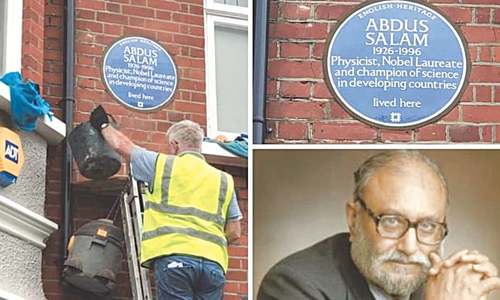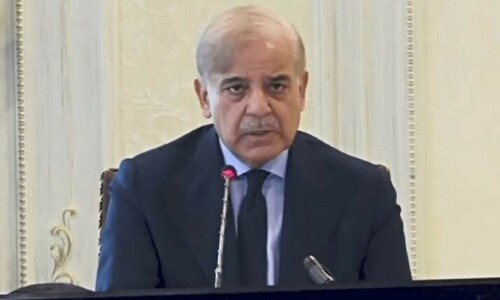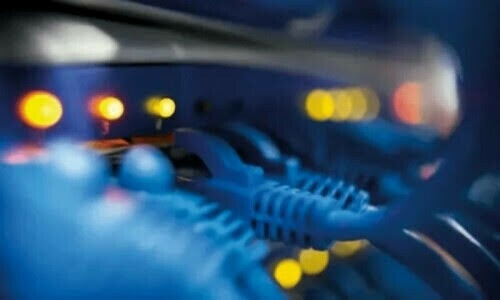
KARACHI: A BSc student at the Imperial College London was going from department to department in search of a topic for his undergraduate physics research paper. It was the early 1960s and at the time, the campus grapevine was abuzz with news of a fresh addition to the faculty; a passionate Pakistani professor inducted straight from Cambridge University.
That student was Dr Robert Delbourgo, now an eminent physicist and recipient of the Walter Boas Medal from the Australian Institute of Physics, who recalled his memories as a student of Pakistan’s first Nobel Laureate Dr Abdus Salam.
Dr Delbourgo reflected on his experiences with Dr Salam during a webinar hosted last week by the Pakistan alumni of the International Centre for Theoretical Physics (ICTP) to mark the 97th birth anniversary of Dr Salam, sharing candid stories from his time spent with Pakistan’s most celebrated and renowned scientist.
Dr Delbourgo recalled how, in 1961, he had to complete a research paper in order to obtain the diploma he was studying for, and ended up being supervised by Dr Salam and Paul Taunton Matthews, another eminent theoretical physicist.
Dr Robert Delbourgo recalls how Nobel laureate ditched cigarettes for snacks; preferred to ‘dine with us plebs’ rather than varsity staff
Recalling his first interactions with Dr Salam, he confessed he was awed. “When he discussed the notion of parity violation, I understood little at the time. But his drive and excitement was very evident. So, I settled upon theoretical physics as my line of research.”
Dr Delbourgo admired him as a teacher “who stood by his students through thick and thin”, adding that he never neglected his responsibilities as a member of staff.
Talking about how the ICTP — now named after its founder, Dr Salam — came to be established, he said, “Dr Salam often recounted the history of how the Middle East kept science alive during the Middle Ages, then transmitted that knowledge to Europe via Spain. It was that vision that drove him on.”
“He wanted to propel the third world into participating [in] purposeful science development,” he said.
According to a BBC report, Dr Salam felt ‘intellectually isolated’ in Pakistan while teaching at Government College, Lahore.
“It became quite clear to me that either I must leave my country or leave physics. It was great anguish for me to leave my country,” he was quoted as saying, at the time.
Delbourgo said he was lucky enough to be a part of his journey thereafter; Dr Salam became his PhD supervisor and the duo ended up collaborating on several research publications.
He recalled that while at the university, Dr Salam was a chain smoker, but later discarded that habit and replaced cigarettes with ‘nibbles’ or snacks, which he would often pull out of his drawer.
Once Delbourgo completed his PhD, he recalled that he went looking for an opportunity for a post-doc. As a mentor, Dr Salam recommended him to the University of Wisconsin, and later offered him his first job at the ICTP in Trieste, Italy.
While talking about the modest personality of Pakistan’s first Nobel laureate, he described how Dr Salam would take his lunch at the cafeteria rather than the staff club, because he enjoyed “mixing with the plebs” rather than other practitioners, and was willing to share his thoughts with his colleagues and students in the hopes of inspiring fruitful directions of research.
He said that Dr Salam took his supervisory responsibility seriously. “I can still picture my study room where some of the graduates were housed. Dr Salam would walk around the study rooms and ask all of his students how they were getting on.”
“I never worked so hard… Dr Salam was keen to lecture on that subject everywhere,” adding that even when Dr Salam was in pain due to acute appendicitis, he would discuss physics at the hospital.
“He was a busy man but he never forgot to do the right thing… I remember well how I was delighted upon receiving huge bunch of flowers on my wedding day and the gift of a beautiful plate inscribed with Arabic upon the birth of my son.”
The former pupil recalled that Salam felt very sad when he was moving to Australia because of his family.
Reflecting on his last meeting with his mentor, who was by then very advanced in his years, he said it was very disturbing to see Salam’s health deteriorating.
“In the early 90s, at a conference in Trieste… it was a heart breaking occasion for me to see him succumb to neurological problems… I think that he recognised me that day… or it’s [might be] just speculation [on my part].”
Dr Abdus Salam passed away at the age of 70, on Oct 21, 1996. He had suffered from a disabling neurological disorder for years.
Dr Salam’s son, Ahmad Salam, who was also a participant in the webinar, shared the regret that none of his descendants seem to want to follow in the great man’s footsteps. “He has many grandchildren now… sadly none of them has any interest in physics and I don’t understand why.”
Published in Dawn, February 6th, 2023














































Dear visitor, the comments section is undergoing an overhaul and will return soon.